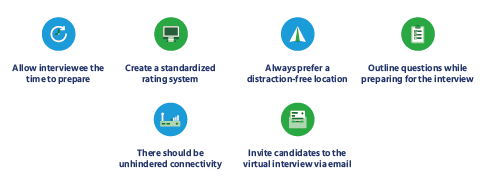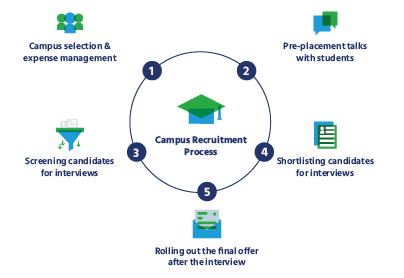Virtual recruiting best practices: How can online recruitment be improved?
Listed below are the best practices for organizations to ensure order and professionalism during the virtual hiring process.

1. Allow interviewee the time to prepare
The best practice is to give candidates some leeway to prepare for the virtual interview rather than blocking the calendar for the same-day meeting. Giving them ample time to prepare will allow candidates to be at their best during the interview. It also reflects the recruiter’s professionalism and thoughtfulness.
2. Create a standardized rating system
Much like in-person interviews, a standardized system should be created to ensure an easy rating of each interviewee’s qualifications. This rating system can help track each candidate’s performance during the virtual interview round. Once recruiters are done with virtual interview processes, they can utilize this rating to identify the most eligible candidates.
3. Always prefer a distraction-free location
Conducting virtual interviews in a quiet and distraction-free environment serves the purpose. If recruiters are interviewing from their homes, finding a calm space so that nobody intervenes is critical. Moreover, there should be a neutral background that doesn’t distract the candidate. It’s ideal to maintain a professional interview environment to preserve the essence of an in-person interview.
4. Outline questions while preparing for the interview
Virtual interviews are not much different from in-person interviews. Therefore, preparing questions beforehand is also essential here. The process begins by reviewing the interviewees’ information, including their resume, cover letter and other professional information. This information becomes the basis for developing questions that are based on the candidates’ experience and qualifications. It’s a good idea to list down every job-related question integral to a standardized rating system.
5. There should be unhindered connectivity
Virtual interviews rely on the quality of the internet connection between both parties. Robust connectivity is crucial to ensure an interruption-free interview. Hence, one should test the connection repeatedly before the interview, including a thorough check of the microphone and webcam. Sometimes, performing a practice interview with a colleague also fool-proofs the process.
6. Invite candidates to the virtual interview via email
The organized way of inviting each candidate for the virtual interview is through email. The invite should distinctly include the date and time and details required to access the interview software. Organizers should have clarity about the format of the virtual interview to avoid last-minute hassles. For example, all the essential information, such as log-in access code, must be mentioned in the email. Additional information should also be made available to the candidates, such as the interview’s expected duration and any other required documentation.









 Behavioral Competencies
Behavioral Competencies Cognitive Competencies
Cognitive Competencies Coding Competencies
Coding Competencies Domain Competencies
Domain Competencies












































Would you like to comment?